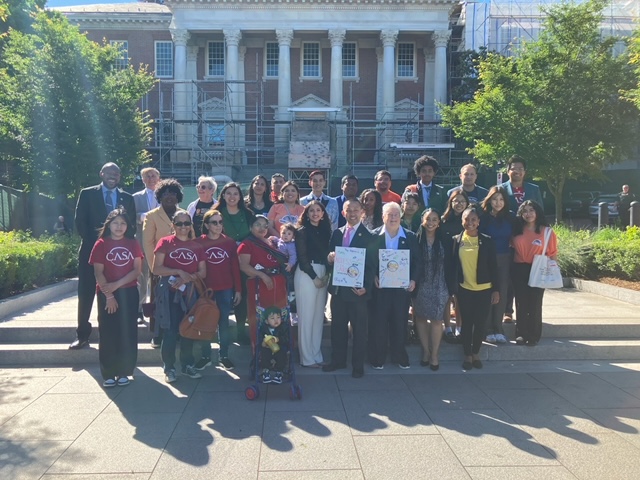October 19, 2018
Maryland Attorney General Brian E. Frosh on Friday urged the U.S. Supreme Court to revive the state’s law aimed at preventing unwarranted price increases of generic drugs.
In papers filed with the justices, Frosh pressed the high court to review and overturn a lower-court decision that struck the law down as unconstitutional.
In April, a divided three-judge panel of the 4th U.S. Circuit Court of Appeals concluded the 2017 law directly regulates the price of generic drug transactions that occur outside the state, authority the Constitution’s Commerce Clause leaves to Congress and not to state legislatures.
The full 4th Circuit in July refused to review the panel’s decision, prompting Frosh’s bid for Supreme Court review arguing that states may regulate generic-drug prices.
“(T)his (Supreme) Court has never held that the states are unable to protect their citizens from harm by imposing requirements for transactions leading to in-state sales of consumer goods that both in-state and out-of-state manufacturers must follow if they wish their products to be sold in a state,” Frosh wrote in his review request. “That question is now squarely presented, and the court should grant the petition and hold that states are not powerless to regulate dangerous, predatory commercial practices that occur in complex interstate markets and will injure people within state borders.”
Frosh’s brief is co-signed by Julia Doyle Berhhardt, the attorney general’s litigation chief and attorney of record before the high court.
The Association for Accessible Medicines, a generic drug industry group, has denied the allegations of price gouging and has successfully challenged the law’s constitutionality so far. The association will have the opportunity to respond to Frosh’s petition before the Supreme Court votes on whether to grant the attorney general’s request for review.
“AAM is reviewing the petition of the attorney general,” Jeff Francer, the association’s general counsel, said in a statement Friday. “We believe the 4th (U.S.) Circuit Court of Appeals correctly determined that the state of Maryland lacks authority under the Commerce Clause of the Constitution to regulate transactions that occur outside of its borders. The Maryland law would harm patients by damaging the national market for more affordable generic medicines.”
The Supreme Court has not stated when it will vote on Frosh’s request in Brian E. Frosh et al. v. Association for Accessible Medicines.
The law, which was slated to go into effect last October, would prohibit a significant price increase of an essential off-patent or generic drug and would give the Maryland attorney general the power to order the manufacturer to explain the reasons behind a significant price boost as well as request a court order restraining or enjoining a violation.
Gov. Larry Hogan in June 2017 allowed the law to go into effect without his signature, citing his concerns about its constitutionality.
The Association for Accessible Medicines filed suit in July 2017, challenging the law as unconstitutional. U.S. District Judge Marvin J. Garbis, who sits in Baltimore, dismissed the Commerce Clause challenge, prompting AAM to appeal.
Overturning Garbis’ dismissal, the divided 4th Circuit panel found three factors pointing to the law’s violation of the Constitution’s clause.
“First, the act is not triggered by any conduct that takes place within Maryland,” Judge Stephanie D. Thacker wrote for the 2-1 majority. “Second, even if it were, the act controls the prices of transactions that occur outside the state. Finally, the act, if similarly enacted by other states, would impose a significant burden on interstate commerce involving prescription drugs.”
For example, “if multiple states enacted this type of legislation, then a manufacturer may consummate a transaction in a state where the transaction is fully permissible, yet still be subject to an enforcement action in another state (such as Maryland) wholly unrelated to the transaction,” added Thacker, who was joined by Judge G. Steven Agee.
Judge James A. Wynn Jr., in dissent, said the Maryland statute falls within the state’s “general police powers to regulate matters of legitimate local concern” without violating the Commerce Clause.
“Here, Maryland legitimately targeted generic drug pricing practices specifically designed to prey on the special vulnerabilities of a defenseless group of Maryland citizens,” Wynn wrote. “Simply put, the Maryland statute – which applies equally to in-state and out-of-state manufacturers and distributors – does not implicate the concerns that lie at the heart of the Supreme Court’s dormant (state-law generated) Commerce Clause jurisprudence: economic protectionism, discrimination against interstate commerce, and state regulation of streams of transactions that never cross through the state’s borders.”
Vincent DeMarco, a public-health lobbyist whose group pressed for enactment of the 2017 law, praised Frosh on Friday for taking the appeal to the Supreme Court.
“Too many people in Maryland cannot afford the lifesaving drugs they need, and the General Assembly responded by passing a critically important measure to stop Marylanders from being price gouged by manufacturers of generic and off-patent drugs,” DeMarco, president of the Maryland Citizens’ Health Initiative, said in a statement. “We are optimistic that the Supreme Court will consider this case and endorse our efforts to keep drug costs in check.”
The 4th Circuit rendered its decision in Association for Accessible Medicines v. Brian E. Frosh et al., No. 17-2166.
Last modified: October 19, 2018


